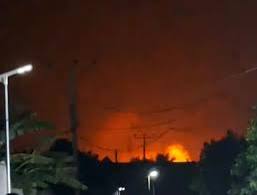A late-night explosion at Giwa Barracks in Maiduguri, Borno State, has reignited national concern over the safety protocols governing military armouries across Nigeria, particularly in heat-prone regions.
The explosion, which occurred on Wednesday, April 30, 2025, sent shockwaves through the city and caused widespread panic among residents. Preliminary investigations by the Nigerian Army and the Borno State Government revealed that the blast was triggered by extreme heat, which reportedly led to the accidental detonation of munitions stored within the barracks. Authorities confirmed that no fatalities were recorded in the incident.
Reacting to the development, the Borno State Commissioner for Information, Professor Usman Tar, said the explosion was “non-hostile” and had been contained by emergency responders, including the state’s Fire Service, the Nigerian Army, and other security agencies. “It was not an attack, but rather a temperature-induced detonation due to the intense heat in recent days,” he stated.
Giwa Barracks, located in one of Nigeria’s most volatile regions plagued by over a decade of insurgency from Boko Haram and Islamic State West Africa Province (ISWAP), houses large stockpiles of military hardware. The incident has raised urgent questions about the security and safety standards guiding the storage of explosive materials, especially in areas where environmental conditions pose significant risks.
Military analysts and safety experts have long warned of the potential dangers posed by poorly ventilated or overheated ammunition depots, particularly in the Northeast where average temperatures often exceed 40 degrees Celsius during peak dry seasons. “There needs to be a national audit of all military storage facilities, especially in climate-vulnerable zones. This explosion should not be dismissed as a freak occurrence,” said security analyst Bashir Modu.
The Nigerian Army has yet to issue a comprehensive report on the matter, but a top-ranking officer who spoke anonymously acknowledged that such incidents highlight the need for improved infrastructure and environmental controls within military bases.
The incident comes amid growing security challenges in the region. Just days prior, the Federal Government announced the appointment of Major General Abdulsalam Abubakar as the new theatre commander for the North-East Joint Task Force, Operation Hadin Kai, in response to a resurgence of attacks in the Lake Chad region.
Residents of Maiduguri have called on the federal government and the military high command to prioritize not only the fight against insurgency but also the internal safety of its installations. “We are grateful that no lives were lost, but we cannot ignore the risks. We live among these barracks, and any lapse in safety could be catastrophic,” said Ibrahim Musa, a resident of Gwange, a community located near the barracks.
As investigations continue, the explosion at Giwa Barracks serves as a stark reminder of the complex challenges facing Nigeria’s security architecture challenges that go beyond firepower and extend into safety, planning, and climate adaptation.







